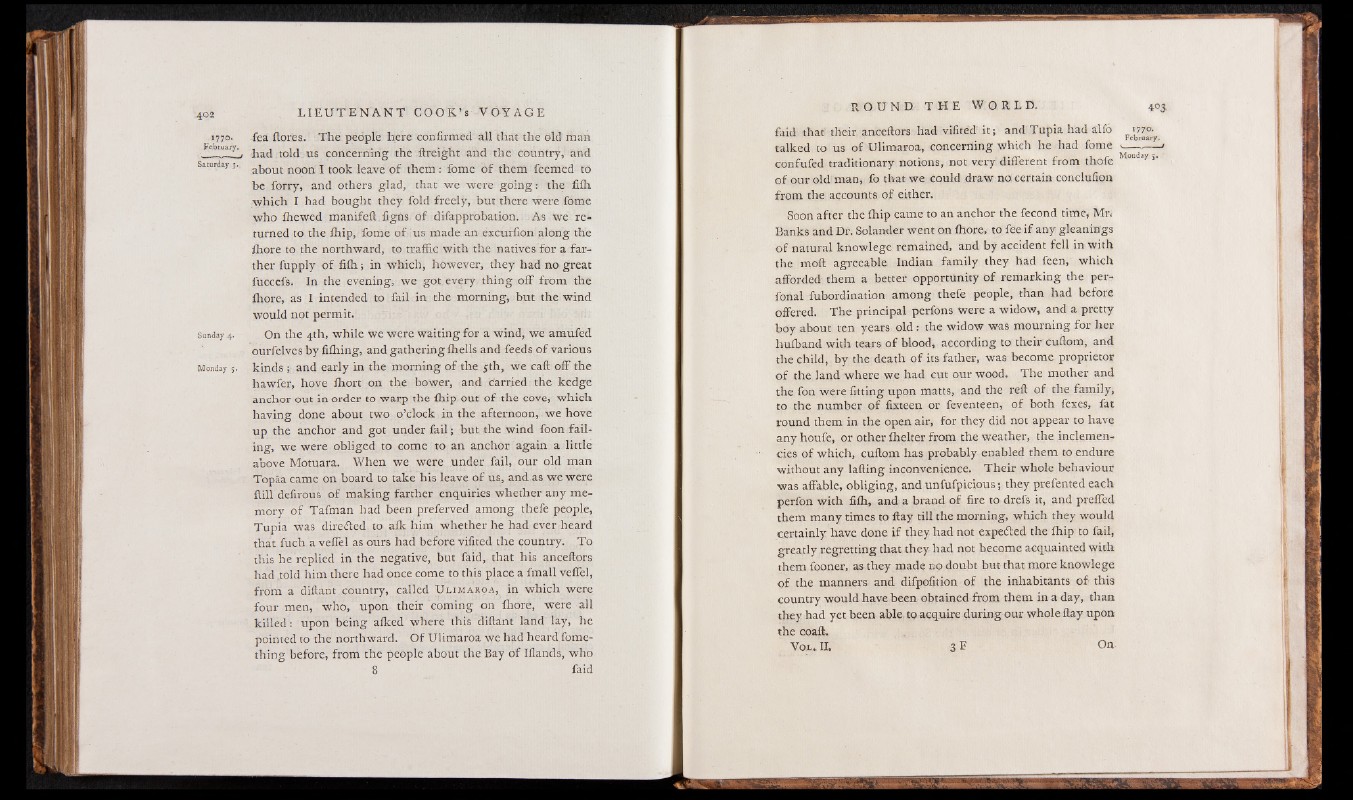
1770. fea ftores. The people here confirmed all that the old man
e l “-'1' , had told us concerning the ftreight and the country, and
Saturday 3. about noon j took leave of them: fome of them feemed to
be forry, and others glad, that we were going: the fifh
which I had bought they fold freely, but there were fome
who fhewed manifeft figns of difapprobation. As we returned
to the Ihip, fome of us made an excurfion along the
fhore to the northward, to traffic with the natives for a farther
fupply of fifh; in which, however, they had no great
fuccefs. In the evening, we got every thing off from the
fhore, as I intended to fail in the morning, but the wind
would not permit.
Sunday 4. On the 4th, while we were waiting for a wind, we amufed
ourfelves by fiffiing, and gathering ffiells and feeds of various
Monday 5. kinds ; and early in the morning of the 5th, we caft off the
hawfer, hove ffiort on the bower, and carried the kedge
anchor out in order to warp the ffiip out of the cove, which
having done about two o’clock in the afternoon, we hove
up the anchor and got under fail; but the wind foon failing,
we were obliged to come to an anchor again a little
above Motuara. When we were under fail, our old man
Topaa came on board to take his leave of us, and as we were
ftill defirous of making farther enquiries whether any memory
of Tafman had been preferved among thefe people,
Tupia was directed to afk him whether he had ever heard
that fuch a veffel as ours had before vifited the country. To
this he replied in the negative, but faid, that his anceftors
had told him there had once come to this place a fmall veffel,
from a diftant country, called U l i m a r o a , in which were
four men, who, upon their coming on fhore, were all
killed: upon being afked where this diftant land lay, he
pointed to the northward. Of Ulimaroa we had heard fome-
thing before, from the people about the Bay of Iflands, who
8 faid
faid that their anceftors had vifited i t ; and Tupia had alfo
talked to us of Ulimaroa, concerning which he had fome \--- ,— b
confufed traditionary notions, not very different from thofe Mor‘day s'
of our old man, fo that we could draw no, certain conclufion
from the accounts of either.
Soon after the ffiip came to an anchor the fecond time, Mr<
Banks and Dr. Solander went on fhore, to fee if any gleanings
of natural knowlege remained, and by accident fell in with
the moft agreeable Indian family they had feen, which
afforded them a better opportunity of remarking the per-
fonal fubordination among thefe people, than had before
offered. The principal perfons were a widow, and a pretty
boy about ten years old : the widow was mourning for her
huffiand with tears of blood, according to their cuftom, and
the child, by the death of its father, was become proprietor
o f the land where we had cut our wood. The mother and
the fon were fitting upon matts, and the reft of the family,
to the number of fixteen or feventeen, of both fexes, fat
round them in the open air, for they did not appear to have
any houfe, or other ffielter from the weather, the inclemencies
of which, cuftom has probably enabled them to endure
without any lafting inconvenience. Their whole behaviour
was affable, obliging, and unfufpicious; they prefented each
perfon with fiffi, and a brand of fire to drefs it, and preffed
them many times to ftay till the morning, which they would
certainly have done if they had not expedled the ffiip to fail,
greatly regretting that they had not become acquainted with
them fooner, as they made no doubt but that more knowlege
o f the manners and difpofition of the inhabitants of- this
country would have been obtained from them in a day, than
they had yet been able to acquire during our whole ftay upon
the coaft.
Vol. H 3 F On